Tuesday, January 10, in a cafe in Bab Jdid, in the heart of the Tunisian capital, the President of the Republic, Kaïs Saïed, discusses with young people. “I hope you will always have hope”, launches them the Head of State then on tour in the popular districts of Tunis. The response of one of his young interlocutors is immediate: “No, we have no more hope. » If Kaïs Saïed remains stoic, accusing lobbies and speculators of all the country’s ills as usual, the video of the exchange circulated widely on social networks, summarizing in itself the state of mind of a youth who once again feel disappointed.
A decade after the revolution that brought down former dictator Ben Ali on January 14, 2011, some young Tunisians wanted to believe in it again, seeing in Kaïs Saïed’s anti-system discourse an opportunity to relaunch revolutionary ideals, in particular for more social justice.
Elected in 2019, with strong support from young people, the president assumed full powers on July 25, 2021, suspending Parliament, before having a reform of the Constitution adopted which enshrines a presidentialist regime, restricts the powers of the Assembly and weakens political parties. The coup was applauded by part of the population exasperated by the inability of the political parties to find solutions to the country’s problems.
snub
But the legislative elections of December 17, 2022, which were to continue this overhaul of the system according to Kaïs Saïed, did not go as planned. The president suffered his first serious setback since his election with an abstention rate of 89% in the first round. A snub to which was added the disaffection of young people. Only 5.8% of 18-25 year olds went to the polls. During the 2019 presidential election, more than 37% mobilized. An unusual surge in a country where this age group traditionally votes little.
Several factors have contributed to this decline: a sluggish electoral campaign, candidates for the most part unknown to the battalion, but also an unprecedented economic crisis which is hitting the country with inflation above 10%. According to Central Bank forecasts, the State needs 1.7 billion dollars to complete its 2023 budget while negotiations with the International Monetary Fund for a loan of 1.9 billion dollars (1.75 billion euros) have been carried forward sine die end December.
In the popular district of Kram, in the suburbs of Tunis, Baraa Toujani, 19, plays a game of chess with a friend in the tranquility of the Cinevog space, a former cinema that has become a cultural place managed by the Mobdiun association which works for the inclusion of young people. The high school student admits that he believed a lot in Kaïs Saïed, as soon as he was elected. During his coup on July 25, 2021, he went out to express his joy in the streets and even participated in demonstrations in favor of the head of state. “But I didn’t vote on December 17 because I don’t see the point. I lost confidence when I saw that prices kept rising and corruption continued,” explains the young man. Baraa says that a candidate even tried to bribe the vote of young people in his neighborhood by promising packs of milk, a product that is regularly out of stock.
Ahmed Sassi, 37, is less disappointed. This primary school teacher, very active in associations within the popular district of Kabaria, was a candidate for the December legislative elections. If he only managed to collect a thousand votes, he considers that this election nevertheless represents progress. “I got involved to give visibility to our work. Our vision is not necessarily the same as that of Kaïs Saïed, but the new electoral law has at least allowed us to stand for election without needing the support of a party, and that is already an achievement” , he said, already thinking of the municipal elections of 2024.
Operation of seduction
His case reminds us that the young people who supported the candidacy of Kaïs Saïed during the 2019 presidential election do not constitute a homogeneous group. “He was supported by youths and not a youth”, confirms Maher Hanin, co-author of the book The Rebellion and the maze of left-wing youth in times of revolution and populism (Editions du Mot Passant, 2019). The sociologist thus makes the difference between the early support for Kaïs Saïed, “a fairly small core”, and those “who saw in him above all the possibility of giving new life to revolutionary ideals”. This youth, from left-wing movements, “is in search of participatory democracy, but fails to materialize the transition to institutional democracy, because it remains unstructured and struggles to gather beyond local support”, according to Maher Hanin.
A national consultation, conducted in 2008, concluded that almost 80% of young people were not interested in politics. Fifteen years later, disinterest is still present, reinforced by “the credibility crisis of politicians and the difficulty of breaking the old system, even for Kaïs Saïed”, emphasizes Maher Hanin.
Newsletter
“The Africa World”
Every Saturday, find a week of news and debates, by the editorial staff of “Monde Afrique”
Register
After the high level of abstention recorded in the first round of legislative elections, the Independent High Authority for Elections (ISIE) decided to launch a vast awareness campaign in mid-January to encourage young people to mobilize during the second round scheduled for the end of the month. “We contacted civil society organizations that work with young people to launch the campaign through community radios. The idea is to organize debates with the candidates who will be questioned by the young people themselves,” Explain Farouk Bouasker, president of the ISIE. A seduction operation that promises to be complicated.
